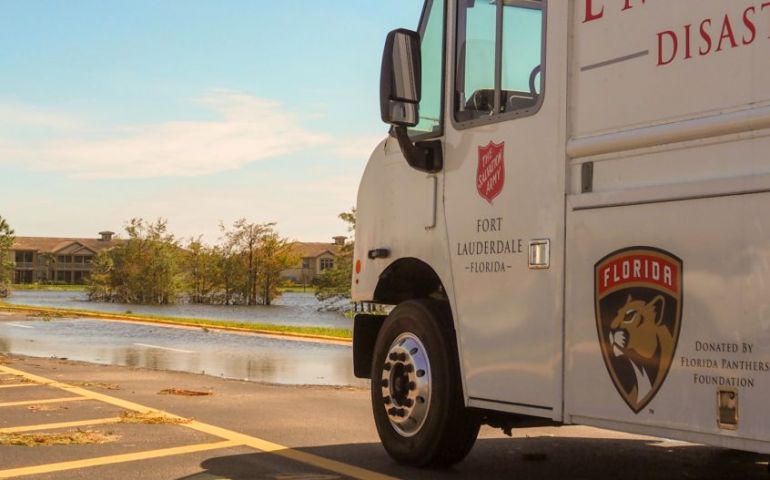The Salvation Army Aiding Those Affected by Hurricane Idalia: Trained professionals identifying needs, conducting outreach in Florida, Georgia
Michelle Hartfield | michelle.hartfield@uss.salvationarmy.org

The Salvation Army's Emergency Disaster Services (EDS) teams are beginning to meet the needs of Florida communities affected by Hurricane Idalia and the life-threatening storm surge it brought to the coast. Before the storm made landfall as a Category 3 hurricane on August 30, trained disaster relief personnel, including more than 35 mobile feeding units, were put on standby to begin serving immediately after the storm passed. Officials have stated that, due to wind damage and substantial storm surge, many affected areas will be difficult to access for weeks to come.
"The Salvation Army will continue to serve communities affected by emergency disasters, just as we have since 1900," said Commissioner Kenneth G. Hodder, National Commander of The Salvation Army. "Whether it is a devastating hurricane like Idalia, wildfires in Hawaii, or record-breaking heat affecting millions of people, we are dedicated to extending support and relief long after a disaster has passed."
In addition to working with other disaster relief organizations, The Salvation Army is also collaborating with federal, state, and local emergency management agencies to monitor ongoing impacts and adapt response efforts as needed. In preparation for these response efforts, several steps were taken to serve those impacted:
- Mobile Feeding Units:
- Florida: The Salvation Army of Florida activated 16 mobile feeding units (eight of these units were mobilized to wait out the storm in a staging area in Lakeland, Florida, while eight others were ready to provide immediate services in communities likely to be affected).
- Georgia, North Carolina, and South Carolina: More than 20 additional feeding units in Georgia and the Carolinas were placed on standby ahead of the storm.
- Incident Management: An Incident Management Team was staged in Lakeland, Florida where its members sheltered in place until it was deemed safe to enter the affected areas and start service to survivors and first responders.
- An Incident Management Team is also deployed in Georgia and another team is on standby in the Carolinas to respond to impending impacts.
- Supply Distribution: The Salvation Army disaster warehouse in Tampa, Florida, was stocked with critical emergency relief supplies, such as food, water, clean-up kits, and baby supplies.
"We are doing everything we can to assess the damage of Hurricane Idalia and serve those in the community who need us the most," said Jeff Jellets, EDS Director for The Salvation Army's Southern Territory. "Earlier this summer, we conducted comprehensive training exercises to prepare for disasters exactly like this and we're more than ready to provide immediate support for those affected by this storm."
To learn more about The Salvation Army's state-of-the-art disaster preparedness training exercises, click here.
The best way to support ongoing efforts in Florida is by making a financial contribution, which allows The Salvation Army to meet immediate and long-term needs. Those who are able to donate can do so through a variety of convenient methods:
- Online: helpsalvationarmy.org
- Phone: 1-800-SAL-ARMY
- Text to Donate: Text STORM to 51555
- Venmo: @SalvationArmyUSA and use the keywords Hurricane Idalia, Hurricane, or Idalia
- Mail: Checks to P.O. Box 1959 Atlanta, Georgia 30301
The Salvation Army annually helps more than 30 million Americans overcome poverty, addiction, and economic hardships through a range of social services. By providing food for the hungry, emergency relief for disaster survivors, rehabilitation for those suffering from drug and alcohol abuse, and clothing and shelter for people in need, The Salvation Army is doing the most good at 7,600 centers of operation around the country. In the first-ever listing of “America’s Favorite Charities” by The Chronicle of Philanthropy, The Salvation Army ranked as the country’s largest privately funded, direct-service nonprofit. For more information, visit www.SalvationArmyUSA.org. Follow us on Twitter @SalvationArmyUS and #DoingTheMostGood.